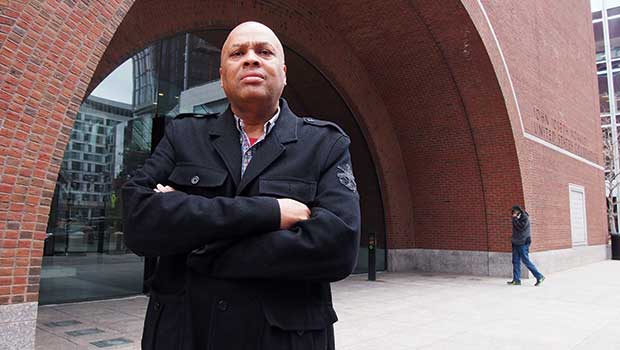City back in court over controversial hair test
Lawsuit focuses on the chemistry of black hair samples

A group of 10 black Boston police officers challenged the Boston Police Department’s use of a drug test they say is unreliable and discriminatory at a bench trial that began Monday morning.
The officers, including former cadet Keri Hogan, first sued the city in 2005 after they were disciplined or fired from their positions when a drug test that used a sample of their hair came back positive for traces of cocaine.
The plaintiffs in the trial, represented by the Lawyers’ Committee for Civil Rights and Economic Justice, claim they did not use drugs, but that African American hair is more susceptible to absorbing drugs from the environment and that the positive results from hair testing do not prove ingestion or use of the drug.
They point to scientific evidence that shows that melanin, found in higher concentrations in dark hair, binds with cocaine. In addition, David Kidwell, a chemist who testified Monday, said that cosmetic hair treatments commonly used by black people can damage hair cuticles and increase the risk of hair contamination by the environment.
Between 1999 and 2006, black BPD officers tested positive for cocaine at a rate of 1.3 percent, while white officers tested positive at 0.3 percent. In 2006, for example, 71 percent of positive results were generated by tests of African American officers.
Psychemedics, the company with which the Boston Police Department contracts for hair testing, claims that the procedures they use to wash hair samples eliminate any possibility of a false positive.
The department began using hair testing in 1999. While urine testing will find evidence of drugs such as cocaine two to four days after use, hair testing can turn up evidence of drug use for as long as a hair has been growing. Psychemedics typically uses hairs from a test subject’s head as well as follicles from arms, legs or other body parts.
The Boston Police Department officers who test positive are given a choice. They can sign a form admitting to drug use and take a 45-day unpaid suspension and agree to drug counseling and random urine testing over the next three years, or they can refuse, and be fired.
The black plaintiffs point to a rising body of scientific studies challenging the validity of hair tests. After a four-year review of hair testing, the federal government chose, in 2008, not to adopt standards for hair testing, and noted that “significant issues have been raised by federal agencies during the review process which require further examination.”
By the numbers
1.3 percent: The rate that black BPD officers tested positive for cocaine between 1999 and 2006.
0.3 percent: The rate that white BPD officers tested positive for cocaine between 1999 and 2006.
The Massachusetts Civil Service Commission also found the scientific evidence against hair testing compelling. In 2013, the Commission ruled that there was not just cause to discharge a tenured police officer solely on hair test results. The Boston Police Department appealed the decision.
In 2014, Superior Court Justice Judith Fabricant upheld the Civil Service finding, ordering the reinstatement of Jones and five other plaintiffs with back pay from the time of termination. The City of Boston has consistently appealed rulings against the police department’s use of hair testing.
In 2016, an appeals court judge ruled that the department refused to adopt an alternate means of testing for drugs that would have “met the department’s legitimate needs while having less of a disparate impact.” A chemist testifying on behalf of the officers recommended in 2003 that the department continue hair testing, but rather than relying solely on the test, institute random urine testing for officers whom Psychemedics found tested positive for cocaine.
Larry Ellison, president of the Massachusetts Association of Minority Law Enforcement Officers, another plaintiff in the case, spoke to the Banner during the trial’s recess on Monday afternoon.
He summed up the city’s defense for continued use of the hair test as, “They have been using it for so long, and they are going to stick with it.”
The city of Boston has spent at least $1.6 million to defend against the officers’ case and the lawsuit has gone before the 1st Circuit U.S. Court of Appeals twice over the last 13 years.
Yawu Miller contributed to this article.






